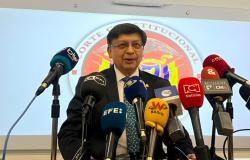
Hear
The libertarian ruling party, with the vice president Victoria Villarruel to the head, suffered a setback that could have unexpected consequences by losing the fight to impose that both the Base Law and the tax reform project be discussed in a single debate before holding two separate votes in the session scheduled for this Wednesday, starting at 10, in the Senate.
At the end of an arduous discussion, Kirchnerism managed to impose its criteria and the projects will be treated separately. That is First the discussion will be exhausted and an initiative will be voted on, the so-called Base Law will open the debate, before moving on to discuss the fiscal package.
Beyond the fact that this scheme will extend the time that the session will take, the ruling party could run the risk of losing the quorum once the first debate is over. A very feasible issue if one takes into account that the discussion of the Base Law could take about seven hours before its vote and that there are some legislators who would be happy to postpone the debate on the tax reform until they are sure that the Lower House does not will reverse the changes that the senators agreed with the Government.
In fact, in the meeting held this Monday afternoon between the block heads it was not finalized whether the debate on both projects would be carried out immediately or If you can vote for an intermediate quarter to resume the discussion the next day or at another time.
For Kirchnerism to win the fight it was the support of some senators from so-called dialogue blocs is key. In that sense, the support of the radical Edith Terenziwho responds to the governor of Chubut, Ignacio Torres (Pro), which joined the request that the representatives of Unión por la Patria had raised, Jose Mayans (Formosa) and Juliana Di Tullio (Buenos Aires).
The senators Kirchnerists were the first to ask that the projects be discussed and voted on separately. Despite the existing precedents, many of which were held during the Cristina Kirchner governments, the Peronist duo argued that it was “sloppy” to hold a single debate before voting on each project.
The ruling party, represented by Villarruel, the head of the libertarian bench, Ezequiel Atauche (Jujuy), and the provisional president of the Senate, Bartolome Abdala (San Luis), tried to defend the unified debate, as happened when the lower house voted on both initiatives on April 30.
But the preaching of the ruling party remained in the minority when Terenzi joined the request of Kirchnerism and other voices joined in behind it, such as that of the provincial Monica Silva (Together We Are Río Negro), which also did not agree with holding a single debate and two votes.
The radicals also sat at the table of block leaders Eduardo Vischi (Currents) and Mariana Juri (Mendoza), the leader of the Pro group, Luis Judge (Cordova), Lucila Crexell (Neuquen), Carlos Espinola (Federal Unit-Corrientes) and Juan Carlos Romero (Federal Change-Salta).
According to the rules established this afternoon, the session will focus almost exclusively on the discussion of the projects, since No tributes or questions of privilege will be acceptedthe latter resource that is usually used as a tool to delay the start of debates.
The session will begin with the discussion of the so-called Base Law and will allow every political conglomerate can score a maximum of 10 speakers They will each have 10 minutes to speak. To this will be added the reporting memberswhich in this case are two, since to the official opinion we must add that of the radical Martín Lousteau (Capital), and the block leadersthat They will have 20 minutes each. In any case, at the end of the meeting the libertarian Abdala said that these times could be extended, especially in the case of closing speeches.
In this stage, The Base Law could require about seven hours before its general vote. If these deadlines are met, Villarruel could be in front of the session at that time, since Javier MIlei would only leave for Europe around 8 p.m. on Wednesday.
Once this deadline has passed, we will move on to the particular discussion of the project. The agreement is to vote by chapters, which are more than 30 in the case of the Bases Law. But the debate may be extended depending on the number of articles that could undergo modifications in the Senate.
It is in the so-called Bases Law where the delegation of legislative powers claimed by the Milei Government and the article that enables the privatization and concession of seven public companies are found, among which is Aerolíneas Argentinas. So far, the ruling party does not have the numbers to support both clauses, so everything indicates that it will have to grant some modifications in the particular discussion.
For the debate on the tax reform, the speech times will be maintained, ten for senators and 20 for reporting members, and the closures, but the number of legislators who can register per political conglomerate will be reduced to five. In this discussion, the Government is preparing to lose the vote on the article that restores the fourth category of Income Tax.





